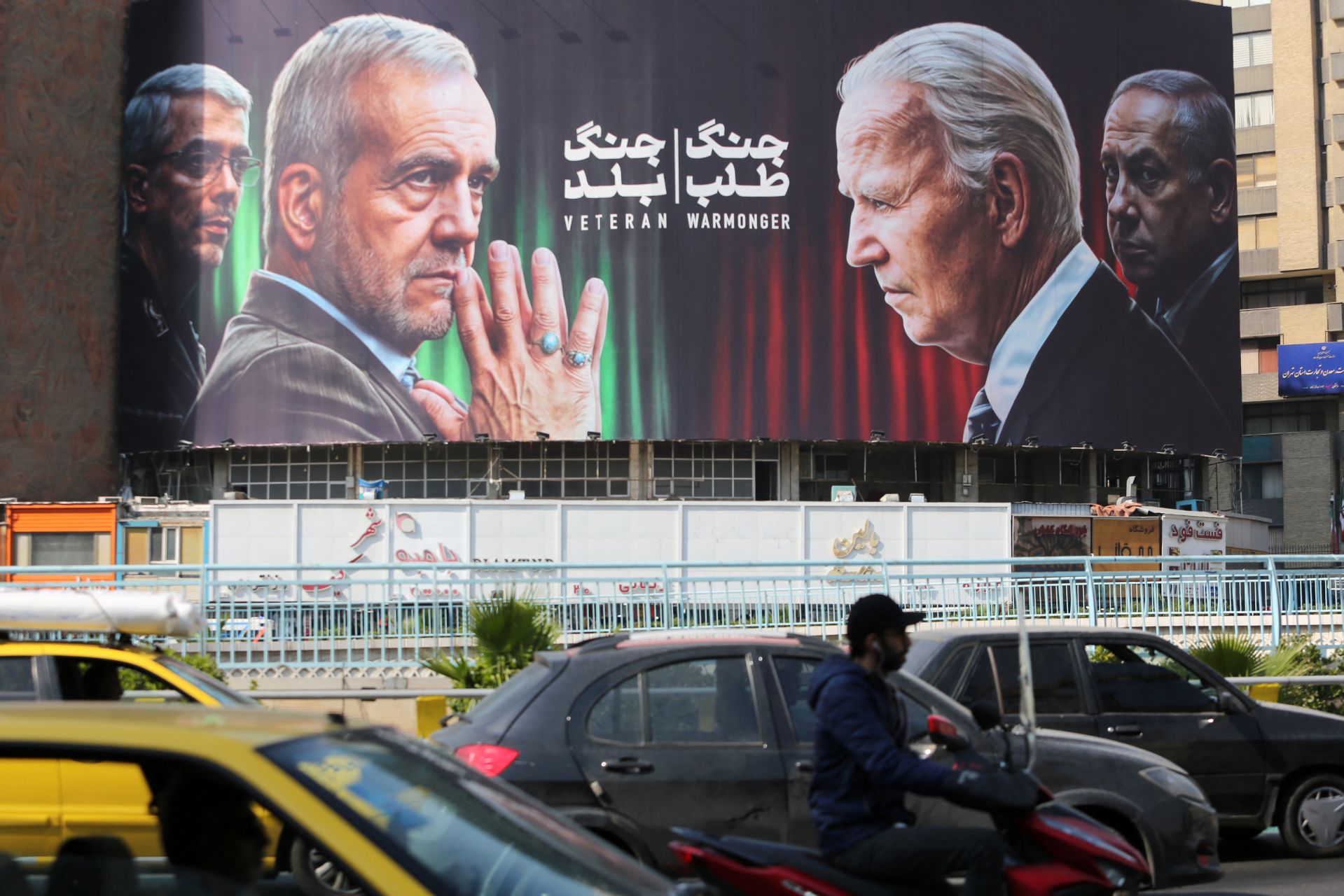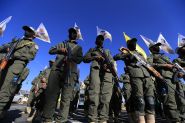- Home
- Middle East
- 'Very Serious': Israel's Blows Against Iran Expose Infiltration

Commuters drive past a billboard bearing pictures of Iran's President Masoud Pezeshkian, armed forces chief of staff Major General Mohammad Bagheri, US President Joe Biden and Israeli Prime Minister Benjamin Netanyahu in Vali-Asr square in Tehran on October 27. ©ATTA KENARE / AFP
A spate of recent intelligence successes by Israel against Iran and its allies have underlined the extent of Israel's infiltration of the establishment in Iran, causing major anxiety for its leadership, analysts say.
It remains a closely guarded secret how, and how deeply, Israel has infiltrated Iran's administration and security apparatus.
But analysts say Israel's recent successes, including assassinations, targeted strikes and secret operations, would be impossible without information being leaked at a high level.
The issue of the extent of Israel's reach inside the Islamic republic is particularly acute as tensions spiral between the two foes, with both sides openly attacking the other's territory for the first time.
In a rare public acknowledgement of the gravity of the matter for the Islamic republic, a senior advisor to supreme leader Ayatollah Ali Khamenei last week said the "problem of infiltration had become very serious in recent years".
"There have been some instances of negligence for years," said Ali Larijani, the former parliament speaker and nuclear negotiator, quoted by the ISNA news agency.
'Hurts you in an instant'
The killing of then-leader of Hezbollah, Hassan Nasrallah, in an Israeli strike in late September in Beirut was only possible with detailed knowledge of the whereabouts of a figure whose movements were closely guarded and shrouded in secrecy.
The former political leader of Hamas, Ismael Haniyeh, was also killed in a residence in Tehran this summer, reportedly using an explosive device that had been placed by Israeli operatives weeks before.
A day earlier, Haniyeh had attended the inauguration of new Iranian President Masoud Pezeshkian and held talks with Khamenei.
Most striking was the simultaneous explosion of hundreds of pagers used by Hezbollah members in Lebanon after a years-long operation to infiltrate the supply chain of the devices, killing 37 people and wounding 3,000.
Though Israel never publicly acknowledged its role in either Haniyeh's killing or the pager attacks, both have been widely attributed to it.
"You have an opponent who thinks for years, and hurts you in an instant," commented Larijani.
'Willing to help Israeli intelligence'
But these were by no means the first such instances attributed to Israel, which is long believed to have carried out sabotage operations through its Mossad spy agency inside Iran.
According to US media reports, the Mossad in 2020 assassinated Iran's top nuclear scientist Mohsen Fakhrizadeh, using a machine gun that its agents had assembled close to his home and then fired remotely after they left.
Iran's judiciary on Tuesday announced it had sentenced three people to death over the killing. The Kurdistan Human Rights Network collective said all three are Kurds, two of them from northwestern Iran and one from northern Iraq.
According to some outlets, including television channel Iran International, Israeli agents have even captured and interrogated Revolutionary Guards inside Iran to obtain intelligence.
Alexander Grinberg, an expert on Iran at the Jerusalem Institute for Strategy and Security, said Larijani's statements "highlight the inability of Iranian services to stop Israeli infiltration".
Kenneth Katzman, senior fellow at the Soufan Center, said Israel is able to find help in all branches in Iran, including the Revolutionary Guards.
"There is a high degree of dissatisfaction within Iran about the Iranian regime and many people, even within the government, are willing to help Israeli intelligence in exchange for money and because they disagree with the regime," he said.
'Someone informed'
Former French espionage agent turned author Alain Chouet said the nature of the killing of Nasrallah indicated that Israel must have had human intelligence, from a source or sources inside Iran, as well as signal intelligence obtained from communications.
"He didn't sleep two nights in the same place, didn't stay two hours in the same place, which was extremely difficult to locate, he didn't have a gram of electronics on him," he told AFP.
"They hit with certainty, hitting the mark at the right time and in the right place. Someone informed."
In an interview within Turkish media in 2020 but which was shared virally this autumn, Iran's former president Mahmoud Ahmadinejad said Iran had established a special unit to target Israeli agents, only to discover the head of the unit had himself "turned out to be a Mossad agent along with 20 others".
"There is tremendous dissatisfaction in Iran with the current leadership and that makes recruitment opportunities for foreign intelligence agencies like Mossad," said Jason Brodsky, policy director of the US-based United Against Nuclear Iran.
With AFP


Comments